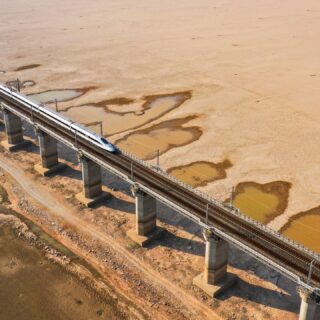We are very delighted to welcome Dr. Jiangjiang Zhang to join the YICODE team
Dr. Jiangjiang Zhang: Integrating Numerical Simulation and Big Data in Optimizing Basin-Scale Water Management
The leaderette: We feel very delighted to welcome Dr. Jiangjiang Zhang to join the YICODE team. Dr. Zhang is an experienced researcher in numerical simulation of hydrological systems. His research also focuses on application of deep learning and data assimilation to solve complex problems.
I grew up in Huixian, Henan Province, which is less than 50 KM from the Yellow River. I am proud to say that I have been fed by the Mother River since I was born. However, due to anthropogenic activities and climate change, water resources in North China is becoming increasingly scarce. For example, the annual runoffs in main rivers of North China have decreased significantly in the past 62 years (1956-2018); The decrease in surface runoff and the over-exploitation of groundwater resources further cause severe consequences like the groundwater depression cone in North China Plain. On December 12, 2014, the central route of the South-to-North Water Diversion Project began to transport water from the Yangtze River. Since then, whenever I returned to my hometown, I would drink water from the Yangtze River instead. This tremendous change made me happy, worried, and at the same time, reflective. What cheered me is that the problem of water scarcity in my hometown and many other regions in North China has been partially resolved. The worry is that the intensified utilization of water resources in the Yangtze River may exceed its environmental carrying capacity in the future. What I am chewing over is how to achieve sustainable development in the Yangtze River Basin under the combined effects of environment changes and human activities?
My research focuses on numerical simulation of hydrological systems, data assimilation and machine learning. Since the 1980s, distributed models have been widely used in the analysis of hydrological processes in river basins . In order to improve the accuracy of hydrological forecasts, it is necessary to fuse numerical models and observational data, and carry out data assimilation analysis. Nowadays, we have entered the “big data era”. In order to better extract information from big data, to gain new understanding of hydrological processes, and to improve the accuracy of hydrological forecasts, machine learning (especially deep learning) has been adopted by researchers, and this technique has shown promising capacities. This year, “How to optimize our country’s water resources carrying capacity under the changing environment, in order to achieve a healthy regional water balance?” was selected as one of the major scientific issues of 2020 (by the China Association for Science and Technology). In answering this question, integrating numerical models, big data analysis and machine learning can help to better predict the temporal and spatial distribution, as well as the evolution of water resources in river basins, which is important for achieving the optimal regulation of water resources carrying capacity.
In this August, I had the honor to join the YICODE team and work with prestigious experts in water sciences from China and abroad. I hope that I can use what I have learned to contribute to the sustainable use of water resources in Yangtze River Basin.




